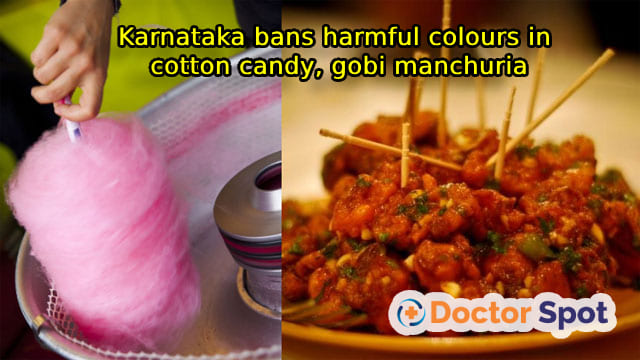Karnataka’s Ban on Harmful Colors in Cotton Candy and Gobi Manchurian

In a commendable move towards ensuring food safety and public health, the Karnataka state government has recently announced a ban on the use of harmful colors in two popular food items: cotton candy and Gobi Manchurian. This decision comes as a proactive measure to protect consumers from potential health hazards associated with the consumption of artificially colored foods.
Cotton candy
Cotton candy, a favorite treat among children and adults alike, is typically made by heating and liquefying sugar, then spinning it out through minute holes where it solidifies in the air and is caught on a stick or cone. Traditionally, cotton candy is pink or blue in color, achieved through the use of food dyes. However, some unscrupulous vendors have been known to use industrial dyes or synthetic colors to achieve more vibrant hues, putting consumers at risk of ingesting harmful chemicals.
Gobi Manchurian
Similarly, Gobi Manchurian, a popular Indo-Chinese dish made from cauliflower florets coated in a spicy, tangy sauce, often features bright red or orange hues. While these colors may be visually appealing, they are often achieved using artificial food colors that may contain toxic substances such as lead, mercury, or arsenic.
Ban on harmful colors
The ban on harmful colors in these food items is a significant step towards ensuring food safety and protecting public health. By prohibiting the use of artificial colors known to be harmful, the Karnataka government is sending a clear message to food vendors and manufacturers that the health and well-being of consumers must take precedence over aesthetic preferences.
This decision is particularly crucial in the context of increasing awareness about the adverse effects of artificial food additives and colors. Studies have linked consumption of synthetic colors to various health issues, including allergies, hyperactivity in children, and even cancer in some cases. By eliminating these potentially harmful additives from cotton candy and Gobi Manchurian, the government is taking proactive measures to safeguard the health of its citizens.
Furthermore, the ban serves as a reminder of the importance of strict regulation and enforcement in the food industry. It highlights the need for stringent quality control measures to ensure that food products meet established safety standards before they are made available to consumers.
conclusion
In conclusion, Karnataka’s ban on harmful colors in cotton candy and Gobi Manchurian is a welcome development that underscores the government’s commitment to food safety and public health. By prioritizing the well-being of consumers over aesthetic considerations, the state is setting a positive example for other regions to follow. It is hoped that similar measures will be adopted nationwide to ensure that all food products meet the highest standards of safety and quality.